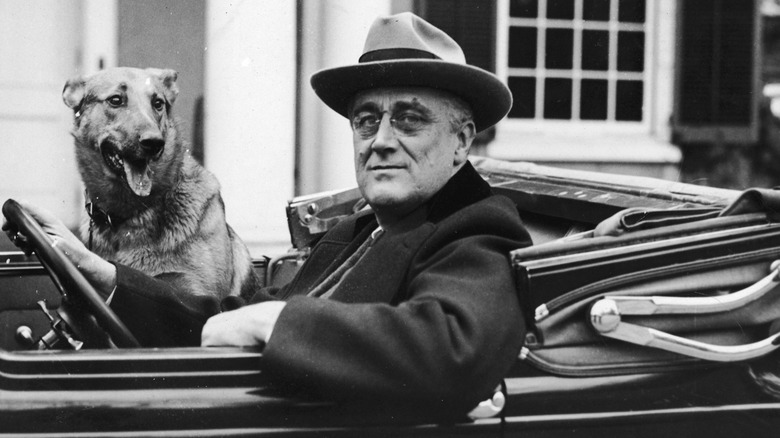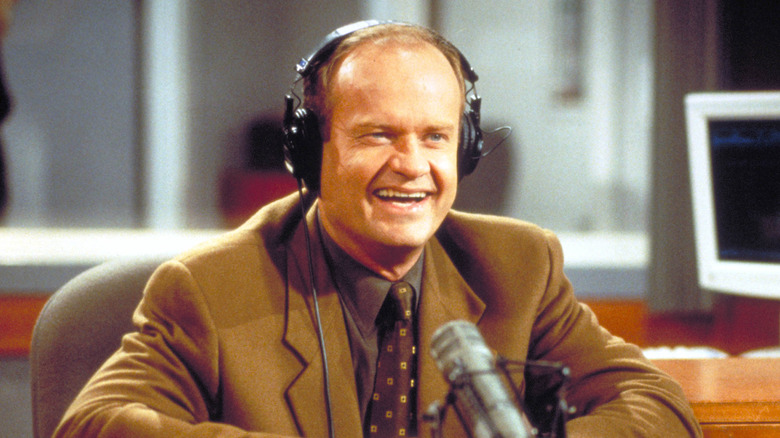History Of The Transatlantic Accent Explained
There's no reason why an accent should denote superiority, but many in the United States have been charmed by the sounds of an English accent for years. The voice of the mother country — or at least the standard King's English dialect — is widely viewed as a sign of smarts and sex appeal. The Jerusalem Post chalked it up to a difference in the way the two countries used the word "right." Elsewhere, Lynne Murphy, author of "The Prodigal Tongue: The Love-Hate Relationship Between American and British English," told The Washington Post that it was the appeal of a foreign sound that wasn't too different. (For Britons themselves, more attuned to their many regional dialects, the "standard accent," known as received pronunciation (RP), has its own connotations).
For a time — roughly the 1910s through the 1940s — some corners of American society tried to capture some of that appeal with the transatlantic accent, also known as the Mid-Atlantic accent. Not a variant on RP but not a native American voice either, the transatlantic accent has been traced back to the work of linguist William Tilly and his early-20th centuryWorld English. Per "Standard Speech: The Ongoing Debate" by Dudley Knight, World English was not designed to reflect any particular country or region. What it was meant to reflect was class and education — someone of a particular upbringing could meet someone else of the same background from anywhere in the world and know they were speaking to an equal. Tilly's teachings were foundational to what became the transatlantic accent.
Hollywood made the accent
William Tilly's primary interest with World English was to distinguish the educated and cultured of society, and his dialect did take roots among the upper crust of America's East Coast. Notable members of high society who spoke this way include Franklin Delano Roosevelt and Jackie Kennedy Onassis. But World English also became popular with classically trained American actors in the early 1900s. Particularly influential among the acting community was Edith Skinner, a disciple of Tilly's who has been credited with standardizing the transatlantic accent for theater and film.
That accent — characterized by dropped "r" sounds, stressed "t" sounds, and softened vowels — took off in popularity with the advent of sound film. Katharine Hepburn is often pointed to as the archetypal transatlantic voice, but it was used throughout Hollywood. It wasn't just taught to American stars either — Briton Cary Grant cultivated the accent in his work. And despite its origins as a status symbol of good breeding, the transatlantic accent was used as a starting point for generic "ethnic" voices in an era when authenticity wasn't a high priority.
But even in the accent's heyday, it wasn't everywhere. Big stars like Humphrey Bogart held onto their own dialects, and the average man on the street wasn't going to school to learn how to pronounce mother as "mothah" — outside the upper-class, people used their regional accents.
Today it's for humor, not sophistication
Amid changing cultural mores after World War II, the transatlantic accent saw a sharp drop in usage. The middle-class everyman replaced the highbrow sophisticate as a default character in Hollywood movies, and actors were more comfortable and more willing to use their natural voices. The fact that the transatlantic accent was artificial — that is to say, it didn't organically originate from anywhere — became a mark against it. It's been derided as fake, a sham, an affectation, and a classist relic.
But while the transatlantic accent's popularity has greatly fallen since the 1940s, it hasn't vanished entirely. It still sees use in mainstream film and television, though often for comedic effect. Among the most prominent examples is Dr. Frasier Crane and his brother Niles, who spoke with equally posh and pretentious Mid-Atlantic voices throughout "Frasier." Kelsey Grammer and David Hyde Pierce use similar voices for Sideshow Bob and his brother Cecil, respectively, on "The Simpsons." And the accent can still be played straight — per Babbel, Disney still favors it for villains.

